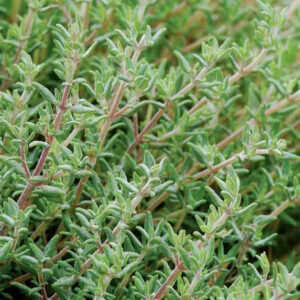 Organic Orange Thyme, Thymus Fragrantissimus, or Thymus x citriodorus is a low growing ground cover thyme ideal for a dry garden “lawn”, can stand to be walked over if infrequently. However their seem to be quite a few varieties of orange flavoured thymes, depends on how they have been crossed I guess. Ours is called Orange Surprise and has small spiky leaves. But I have seen other types of orange that more resemble classic Lemon thyme, growing up to 30cms tall.
Organic Orange Thyme, Thymus Fragrantissimus, or Thymus x citriodorus is a low growing ground cover thyme ideal for a dry garden “lawn”, can stand to be walked over if infrequently. However their seem to be quite a few varieties of orange flavoured thymes, depends on how they have been crossed I guess. Ours is called Orange Surprise and has small spiky leaves. But I have seen other types of orange that more resemble classic Lemon thyme, growing up to 30cms tall.
Like all thymes the plant is highly resistant to disease, it likes sun and poor well drained soil; It needs a weekly water for the first Summer but after that best left alone unless there is a long period of drought. Over watering will cause the roots to rot. Frost hardy. If you are going to grow it in a pot then a broad shallow bowl shape is best, giving the plant a bit of room to spread, and make sure it drains well, sitting in water will kill the plant.
It flowers in late Spring early Summer with small white to pink flowers. The orange flavour is quite subtle in fresh leaves but intensifies when dried.
Organic Orange Thyme like other ground cover thymes spreads by pushing out long fresh shoots which then establish their own roots.
This growth pattern makes reproduction easy, in Spring you simply test each shoot to see if it has established roots, and if it has simply cut the shoot off from the mother plant, gentle lift the shot from the ground by using a spoon or trowel to pull up the roots, and repot. You can speed up the formation of roots on the shoot by pinning them closer to the ground, I just pop a small stone on top of the shoot
Medicinal uses of Organic Thyme
I am no Doctor so I will just pinch this from Wikipedia’s thyme page. I can vouch for the benefits of Thyme tea with honey, helps me with my smoker’s cough.
Oil of thyme, the essential oil of common thyme (Thymus vulgaris), contains 20–54% thymol.[8] Thyme essential oil also contains a range of additional compounds, such as p-cymene, myrcene, borneol, and linalool.[9] Thymol, an antiseptic, is an active ingredient in various commercially produced mouthwashes such as Listerine.[10] Before the advent of modern antibiotics, oil of thyme was used to medicate bandages.[2] It has also been shown to be effective against various fungi that commonly infect toenails.[11Thymol can also be found as the active ingredient in some all-natural, alcohol-free hand sanitizers.
More on Organic Thyme
